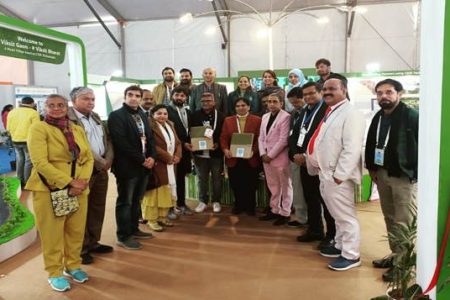Faridabad; The India International Science Festival (IISF 2023) continued its trailblazing journey during the second day on January 18, 2024, in Faridabad, Haryana. A remarkable event unfolded as the Know-How Technology concerning “Bamboo Composites” was officially transferred to the esteemed materials manufacturing company, M/s Asili Bamboo Products, Meerut. The ceremony, graced by Dr. Avanish Kumar Srivastava, Director of CSIR-AMPRI, Bhopal, and Mr. Akshay Joshi, Director of M/s Asili Bamboo Products, Meerut, marked a significant stride in sustainable and innovative materials development.
Various dignitaries, including Mr. Md. Ali Shah from Sadhana; Dr. C. Anandharamakrishnan, Director of CSIR-NIIST Trivandrum; Prof. Manoranjan Parida, Director of CSIR-CRRI, New Delhi; Dr. B. Chandrasekaran, Former Director of CSIR-CLRI; Prof. Sudhir Singh Bhadauria, Director of UIT RGPV Bhopal; Shri Mayank Mathur, RC Member from CSIR-Headquarter; Dr. J.P. Shukla, Chief Scientist; Mr. Somnath Mazumder, CoA; Dr. J.P. Chourasia, Head PPD, CSIR-AMPRI; Dr. Sandeep Singhai, Head Business Development; Dr. Sarika Verma, PI and Principal Scientist; Dr. Neeta V.M. Khalkho, Sr. Principal Scientist, CSIR-AMPRI; and Dr. Satanand Mishra, Principal Scientist, CSIR-AMPRI, Bhopal, were also present on this momentous occasion.
The bamboo composites, an industrial product resulting from environmentally friendly techniques applied to the versatile resource bamboo, were developed as part of this innovative technology. Recognized as a grass, bamboo grows rapidly without stringent regulations, reaching maturity within 3-4 years, as opposed to teak wood, which requires 30-40 years. Apart from its quick growth, bamboo excels as a natural absorber of CO2, contributing to environmental sustainability.
The bamboo composite product, resembling teak wood, offers superior durability, dimensional stability, high strength, density, mechanical strength, fire resistance, moisture resistance, and a natural, aesthetic appearance.
CSIR-AMPRI’s bamboo composite technology involves sequential steps, including cutting bamboo poles to desired sizes, splitting them into strips, removing knots, chemical treatment for protection against microbial/natural degradation, conversion to fibrous form without compromising natural strength, coating with a pre-polymer, and compaction under appropriate heat and pressure. The resulting composite can take various shapes, such as molded articles, plain sheets, thick boards, beams, etc., which can be further machined for the final finished product.
Following successful industrial trials, CSIR-AMPRI has developed panel boards, beams, pillars, partitions, doors, window frames, roofs, and floorings using bamboo composites. A “Demonstration Structure” named “Baithak,” made entirely of bamboo composites, was erected at the CSIR-AMPRI Bhopal campus in January 2022. This hexagonal structure, with a peak height of 13′ 8″, a max span of 24’8″, and a floor area of 253 sq. ft., showcases the versatility and potential of bamboo composites. A similar structure has been recently erected at CSIR-NEIST, Jorhat, Assam, using AMPRI’s bamboo composite technology, further exemplifying its applicability and sustainable impact.
The technology transfer to M/s Asili Bamboo Products is a testament to the collaborative efforts in advancing sustainable materials for a greener and more environmentally conscious future.

